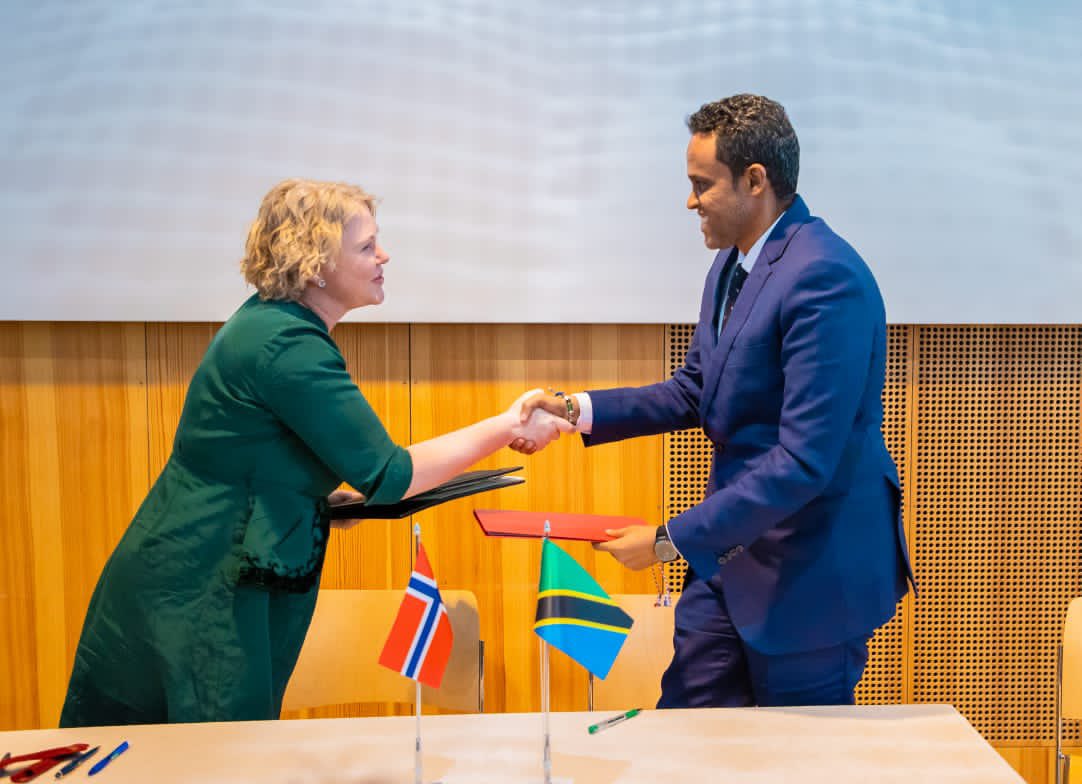Kilimokwanza.org Team
The recent signing of a Collaboration Agreement between the Tanzania Agricultural Research Institute (TARI) and the Norwegian Institute of Bioeconomy Research (NIBIO) marks a pivotal moment in the international effort to address the dual challenges of climate change and food security. This partnership, endorsed and celebrated in the environmentally conscious setting of the Climate House in Oslo, Norway, on February 14, 2024, signifies a significant stride towards enhancing agricultural sustainability and bolstering climate resilience on a global scale.
The ceremony, attended by a host of dignitaries including President Samia Suluhu Hassan of the United Republic of Tanzania and a cadre of key government officials from both nations, underlines the profound significance attributed to this initiative. This gathering of influential figures such as the Tanzanian Minister of Agriculture, Hon. Hussein Bashe, and the Norwegian Minister of International Development, Hon. Anne Beathe Tvinnereim, not only showcased the high level of mutual commitment but also the spirit of international collaboration aimed at confronting some of the most formidable challenges of our time: climate change and ensuring food security for future generations.
Dr. Thomas Nestory Bwana, the Director-General of the Tanzania Agricultural Research Institute (TARI), and Mr. Ivar Horneland Kristensen, the Director-General of the Norwegian Institute of Bioeconomy Research (NIBIO), signed the landmark Collaboration Agreement. This agreement, aimed at Improving Soil Health for bolstering climate resilience and food security.
This agreement between TARI and NIBIO is a show of the power of leveraging scientific research and technological innovation in the quest to ameliorate soil health, a cornerstone of sustainable agricultural practices. Soil health is crucial for the resilience of agricultural systems against the increasingly volatile impacts of climate change. It affects everything from crop yield and quality to water filtration and the storage of carbon, thus playing a significant role in both food production and climate mitigation efforts. The collaboration is poised to drive significant advancements in soil health research, combining the expertise and resources of both institutions to develop innovative solutions that can be applied not only in Tanzania and Norway but globally.
Moreover, the signing of additional Memoranda of Understanding (MoUs) and a grant agreement during President Hassan’s state visit illuminates the broader context of this partnership. These agreements encompass a wide range of initiatives aimed at strengthening bilateral relations between Tanzania and Norway, with a specific focus on agricultural cooperation, environmental research, and academic exchange. The grant of 9.9 million Norwegian Kroner earmarked for research on soil health and climate resilience underscores Norway’s commitment to supporting Tanzania’s efforts to combat the adverse effects of climate change on agriculture.
President Hassan’s appeal for global action on climate change, made during her address at a conference on Climate Change and Food Security, resonates with the urgent need for international collaboration in overcoming these challenges. Her call to action is backed by Tanzania’s commendable resilience in managing food security, highlighted by the country’s success in supplying five million tons of food to neighboring countries during the 2022/2023 period despite the global crisis. This achievement not only demonstrates Tanzania’s proactive and effective management of food security challenges but also serves as a beacon of hope and a model for other nations grappling with similar issues.
The bilateral engagements that took place during the state visit, including meetings with Norway’s King Harald V, discussions with the Prime Minister, and participation in the Oslo Energy Forum, further cement the warm relations between Tanzania and Norway. These interactions reflect a shared vision for sustainable development, environmental conservation, and the well-being of their peoples, highlighting the importance of diplomacy and international cooperation in addressing global challenges.
This pioneering model of international cooperation between Tanzania and Norway, with its focus on scientific exploration and environmental guardianship, offers a blueprint for other nations. It shows how strategic partnerships can facilitate the sharing of knowledge, resources, and technology to address global challenges more effectively. By combining their strengths, Tanzania and Norway are not only working towards enhancing their own agricultural sustainability and climate resilience but are also contributing to the global effort to establish a more secure and sustainable food system.
The implications of this collaboration extend beyond the immediate benefits to agriculture and climate resilience. They encompass broader socio-economic benefits, including the potential for job creation in the research and development sectors, the enhancement of food supply chains, and the strengthening of rural economies through improved agricultural practices. Moreover, this partnership stands as a testament to the importance of soil health in the wider context of environmental conservation, emphasizing the interconnectedness of soil management, biodiversity conservation, and climate action.
As the world grapples with the escalating impacts of climate change and the persistent challenge of ensuring food security for a growing global population, initiatives like the TARI-NIBIO collaboration offer hope and a path forward. They exemplify how targeted research, international cooperation, and a commitment to sustainable development can converge to create resilient agricultural systems capable of withstanding the challenges of the 21st century and beyond.
In Tanzania, the agricultural sector is dominated by smallholder farmers who are vulnerable to climate extremes such as droughts and erratic rainfall, in addition to other challenges such as land degradation, poor soil health management and limited access to new farming technology
